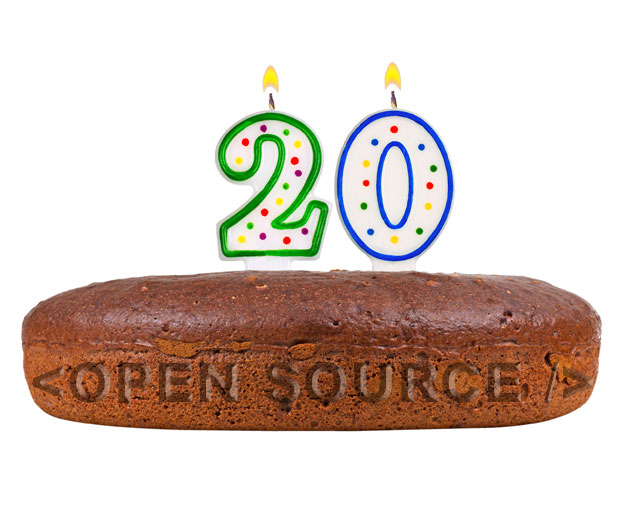Open Source
Open source software turns 20
Tuesday, February 6, 2018

|
Richard Harris |
Thoughts about the open source 20 year milestone, it's use, and where open source might be in another 20 years.
First let me say in full disclaimer that I love open source software and initiatives, and I come from the enterprise world as it where in 1998. The days where IT budgets were as fat as overfed guppy goldfish, and open source tech was barely used in production environments.
Open source source software has always had the same set of challenges following closely behind it;
- Why would I use software that everyone can view the source code to?
- Where is the support going to come from, outside of the rouge user forums?
- How am I going to bunker my implementation?
- How do I keep from looking cheap, and brother in a basement company A?
- Why would I want to save money when the budget money isn’t mine anyway?
If you are an app developer that really isn’t too concerned with open source, think again. Android is Google’s own mobile OS based on a modified version of (you guessed it), the open source Linux Kernel.
Want some other examples of software you are using that you probably don’t think of that are also open?
- Firefox web browser
- Apache web server
- GIMP
- Apache Cordova
- Appcelerator Titanium
- Bootstrap
- LibreOffice
- JQuery Mobile
- PhoneGap
- Qt
- Sencha Touch
- And countless others..
Speaking of QT, we recently had a chat with Lars Knoll, CTO of The Qt Company (a provider of an open source software framework for the development of apps and devices) to hear his thoughts on the 20 year milestone.
ADM: Looking back at 20 years what does the usage look like today?
Knoll: It's no longer a niche technology within the developer community – it is now an acceptable technology model for the business world, and is being used by organizations of all types and sizes for all kinds of projects. To illustrate that, over the past years we’ve seen some of the biggest tech giants, such as Google and Microsoft, embrace open source for their own businesses.
ADM: How as the definition of open source changed over the years?
Knoll: Releasing the source code for an application was first adopted by the research sector and universities, and as such, it had quite a narrow focus in its infancy. A formal definition of what open source is was first attempted 20 years ago with the founding of the Open Source Initiative. This definition has so far nicely passed the test of time, and I don't think its definition has changed since then. What has changed dramatically, however, is the understanding of how to utilize open source in businesses and how companies can engage in different open source projects.
ADM: If you were to pick one thing in Open Source that opened the gates to wider adoption, what was it, and when was it?
Knoll: I’d say Linux was the thing that opened the gates to wider adoption of open source. Linux changed the landscape because it was that one missing piece of the open source ecosystem: the operating system. And with the introduction of Linux, by the mid-1990’s you could run everything on top of Linux as a running open sourced system: email, web browser, etc.
ADM: What are the biggest advantages, and disadvantages of using open source tech in the enterprise?
Knoll: Open source can radically transform how a company develops and maintains their products. The most important thing to realize, however, is that while open source doesn't have a direct cost associated with it (as you can simply download and use it), using it does not come for free. As opposed to commercially supported products, open source software does not come with support. There's no company taking liability for using it, either. More importantly, there's the cost of keeping your software stack up to date, which often requires getting involved in the open source software you are using. Without that involvement, companies run considerable risks in regard to possible problems or security issues their software might have due to the usage of open source software. In the end, this means that using open source software comes at a cost, but instead of licensing costs, the price is usually paid in employee resources: having people who know the software and are ideally contributing to the open source project.
ADM: Does open source have a brighter future than when it started, and where do you see it in another 20 years?
Knoll: Open source has a brighter future than when it started, and it will be very interesting to see how it continues to evolve – for example, we’re now seeing that major open source projects are starting to be dominated by one company (such as Google), while traditionally, an open source project would have been collaborated on by many companies and developers. We’ve also seen open source picked up by some companies that had traditionally been quite closed (such as Microsoft), so we’re likely to see open source be adopted by other companies and industries we may not have expected. But regardless of the path open source takes moving forward, it has been an overwhelming success since its introduction decades ago.
Lars Knoll is the CTO of The Qt Company and a Senior Software Architect with 12+ years of experience in Software Development, Architecture. Worked on and lead large, distributed projects efforts that involved complex multi-cultural/multi-site setups. Lots of experience with open source development, desktop as well as embedded/mobile operating systems. @LarsKnoll

Become a subscriber of App Developer Magazine for just $5.99 a month and take advantage of all these perks.
MEMBERS GET ACCESS TO
- - Exclusive content from leaders in the industry
- - Q&A articles from industry leaders
- - Tips and tricks from the most successful developers weekly
- - Monthly issues, including all 90+ back-issues since 2012
- - Event discounts and early-bird signups
- - Gain insight from top achievers in the app store
- - Learn what tools to use, what SDK's to use, and more
Subscribe here









